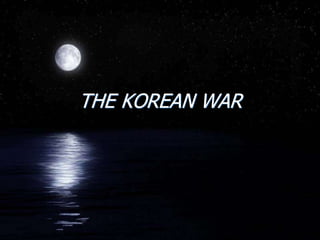
Korean War
- 2. Setting the Scene “America’s forgotten war” Americans struggled to push back the Communists, who had made huge advances Both sides dug into their positions “sitting war”
- 3. Roots Chinese Civil War Foreign powers exerted influence on and held some small possessions of Chinese territory Japan and Germany were involved Japan got control of German possessions there after WWI, increasing Japanese power in China China called for a stronger, more independent country Democracy, nationalism, or communism
- 4. Nationalist Party Nationalists in the north (Chiang Kai-shek) Communists in the south (Mao Zedong) around Shanghai This led to a civil war in 1927 when Chiang sent troops to attack the Communists and their supporters
- 5. Mao Gained support for the Communist cause by redistributing land to the peasants and offering the schooling and health care. This division continued for a long time between the groups, after WWII Nationalists lost support b/c of their harsh treatment of the population, high taxes, and corruption Mao’s land reforms and his promise of equality and military victories led Communists to power in 1949 Nationalists fled to Taiwan
- 6. Dividing Korea Before WWI, Japan also annexed the Korean peninsula Harsh rule by the Japanese Koreans hoped that the defeat of Japan would lead to restoration of their own power WWII ended before the plans for Korean independence could be worked out
- 7. 38th Parallel Allies agreed on a temporary solution Soviet soldiers accepted the surrender of Japanese troops north of the 38th parallel, which was the latitude line running across Korea at the midpoint of the peninsula Americans did the same south of the parallel It was never meant to be permanent It created a Soviet-occupied northern zone and an American occupied southern zone
- 9. Korean War Koreans wanted to unify their nation on both sides of the line North Korean troops streamed across the 38th parallel, hoping to reunite Korea by force Americans thought this was Soviet- led, a case of aggression Truman felt that if the Americans did not respond, Communism would spread He believed WWIII would start if the US did not intervene
- 10. UN Police Action The UN blocked Communist China’s admission to the UN in 1949 Soviets walked out in protest Thus could not exercise its veto power when Truman brought up the issue of North Korean aggression to the UN The US gained unanimous approval for resolutions that branded North Korea as an aggressor
- 11. Truman’s steps Protected Taiwan Ordered US air and naval support for the South Koreans Sent ground troops in He did NOT go to Congress and ask for a declaration of war, but Congress was very supportive UN set up 16 nations to contribute troops or arms, but the US was 80% of the force
- 12. Douglas MacArthur MacArthur was Truman’s choice to lead the UN forces in Korea Based in Japan Responsible for establishing western democracy there and for creating Japan’s new democratic constitution
- 13. North Korean advance North Korean troops swept through South Korea in a few weeks MacArthur defended Pusan (SE South Korea), and then landed troops at Inchon (NW South Korea) and attacked enemy supply lines from behind The strategy worked, and the North Koreans fled back across the 38th parallel
- 15. China’s warning China was concerned that the South Koreans and Americans would take power They threatened the US not to advance any further MacArthur ignored them “Home by Christmas” drive: Nov. 24, 1950, designed to drive the enemy across the North Korean border at the Yalu River in to China and end the war
- 16. That didn’t work... Chinese troops poured across the Yalu River into North Korea to take the offensive Chinese and North Korean troops pushed the UN forces back into South Korea Led to a stalemate
- 17. MacArthur’s next steps Wanted to open a second front to break stalemate He wanted Jiang’s forces at Taiwan to return to the Chinese mainland to attack the Chinese Communists Truman was opposed to this, fearing it could lead to a widespread war in Asia
- 18. The letter MacArthur sent a letter to House Minority Leader Joseph Martin in March 1951 Attacked the president’s policies Martin made the letter public On April 11th, Truman fired MacArthur for insubordination He received a hero’s welcome when he came back
- 19. War continues... The war dragged on for over two more years Truman now very unpopular, did not have a good approval rating Eisenhower came in, wanted peace talks Ike threatened to use atomic weapons A truce was signed in 1953, leaving Korea divided at about the 38th parallel
- 20. Effects of the war 54,000 American soldiers killed 103,000 wounded Limited results: why the deaths? Communist forces were pushed back Containment occurred without nuclear war
- 21. Other effects... Korean War was the first in which white and African Americans served in the same units Huge increase in military spending By 1960, 1/2 of budget went to defense 1/2 million soldiers stationed around the world: permanent mobilization Military-industrial complex: employed 3.5 million Americans by 1960: kept the arsenal going
- 22. Relations with Japan US signed a peace treaty with Japan in 1951 Korean war did ruin relations with Communist China